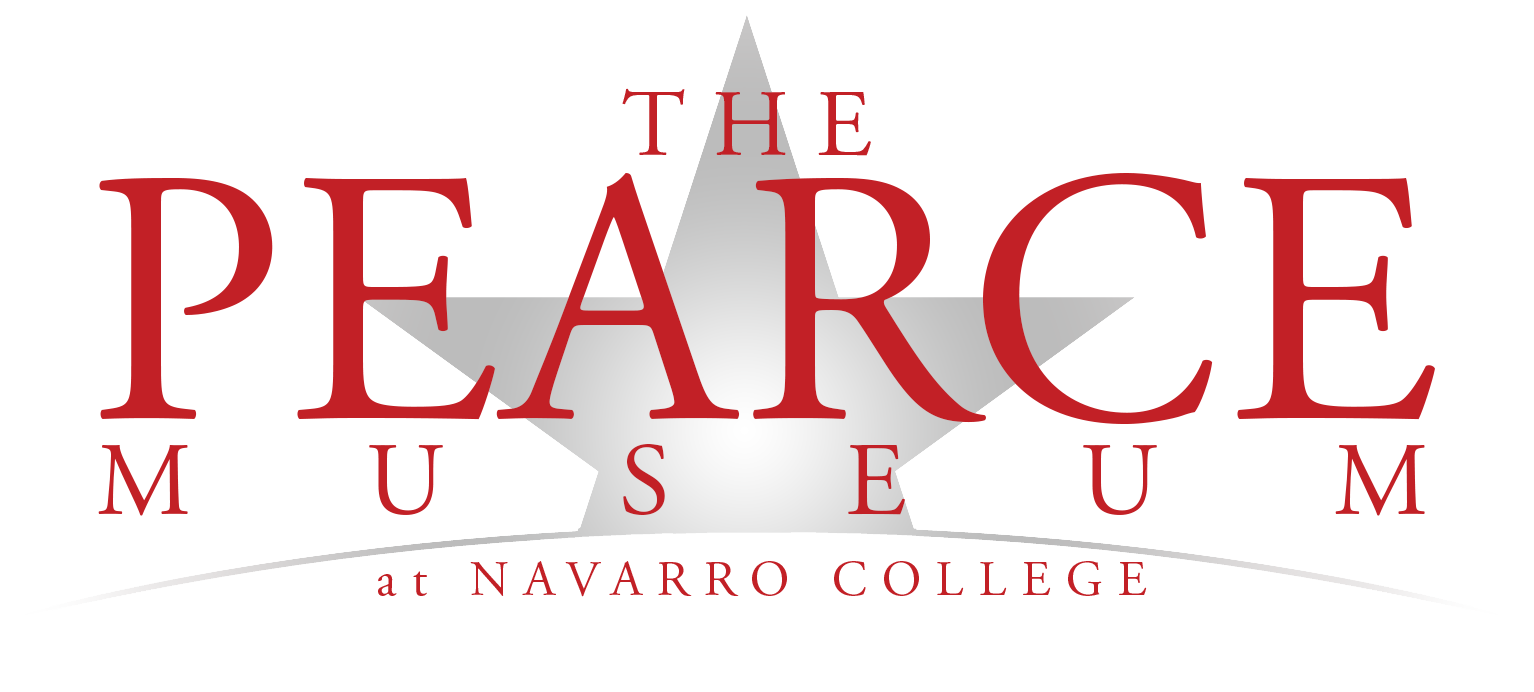Facts from Lincoln’s Assassination and Death
On the night of April 14, 1865, while attending the play “Our American Cousin” at Ford’s Theatre, President Abraham Lincoln was shot by John Wilkes Booth. Lincoln would die the next day, and a manhunt for the murderer and his conspirators ensued, as well as a long period of national mourning.
1. Lincoln dreamed about being assassinated before his death
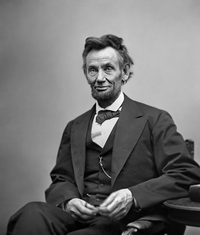
Abraham Lincoln
It is widely believed that Lincoln anticipated his assassination, as three days before his death he discussed with Ward Hill Lamon, his friend and biographer, a dream he had in which he was assassinated. On the night he made his trip to Ford’s Theatre, Lincoln also told his bodyguard, William H. Crook, about having the dreams for three straight days, and when leaving the White House bid him, “Goodbye,” instead of his characteristic, “Good night.”
2. Booth was physically close to Lincoln six weeks earlier
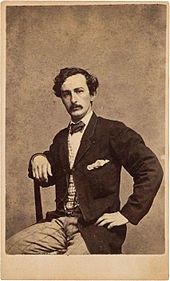
John Wilkes Booth
John Wilkes Booth may have made an earlier assassination attempt at Lincoln’s second inauguration six weeks before the actual murder. Booth waited on the Capitol Rotunda for the President to emerge to make his speech, and reportedly lunged at him before being stopped. Booth was not removed from the viewing area, however, and can be seen in photographs watching Lincoln’s speech.
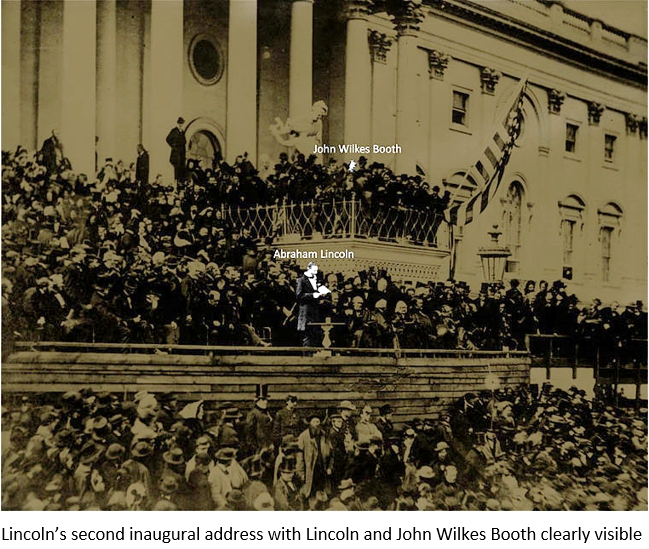
Lincoln’s second inaugural address with Lincoln and John Wilkes Booth clearly visible.
3. General Grant was also a target.
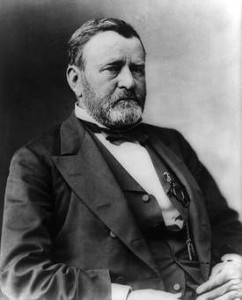
Generall Grant
Booth’s conspiracy on April 14, 1865 was to murder a number of top members of the Lincoln Administration, including General Ulysses S. Grant, who was expected to attend the play with the President and his wife, Mary Todd. Grant and his wife were not fond of the First Lady, however, and declined Lincoln’s invitation to the play, saying they were visiting family in New Jersey. Had Grant been there, he may have been assassinated as well, or (as he believed) even foiled Booth’s attempt, something he regretted later in life.
4. Lincoln almost didn’t go to Ford’s Theatre
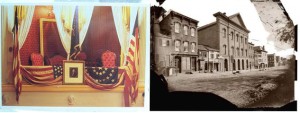
Ford’s Theatre
Lincoln was reportedly reluctant to attend the play at Ford’s Theatre, in part due to his earlier foreboding dreams, but felt obligated to attend with his wife after General Grant turned down his invitation.
5. Lincoln’s bodyguard was in the saloon
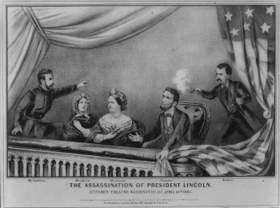
Lincoln Assassination
President Lincoln’s bodyguard, Officer John Parker, was supposed to be guarding the door to Lincoln’s private box on the night of the play, but was missing at the time of the assassination. He had earlier left his position to watch the lay, and was in the saloon next door during the intermission, but did not return to his post afterward.
6. The original plan was to kidnap Lincoln
In March 1865, before the end of the Civil War, Booth met with his conspirators to form a plan to kidnap the President after he left a play at the Campbell Hospital on March 17. That plan was scrapped when Lincoln changed his plans at the last minute to attend a military ceremony, and Booth shifted to a kidnapping after the play at Ford’s Theatre. Booth changed his plan again, however, after General Robert E. Lee’s Confederate surrender, to one of murder.
7. Booth’s co-conspirator got too drunk to kill the Vice President
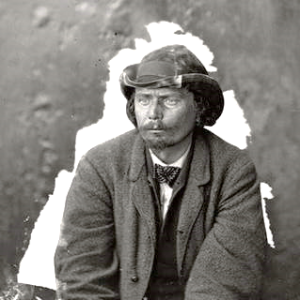
George Atzerodt
Booth had several co-conspirators on the night of the assassination to carry out his plan to destroy the leadership of Lincoln’s government, with a man named George Atzerodt sent to kill Vice President Andrew Johnson at his resident at the Kirkwood House hotel. Atzerodt had rented a room above Johnson’s and was preparing to kill him with a knife at the same time Booth killed Lincoln, but reportedly got to drunk in the hotel saloon instead. He then wandered the streets of Washington, and tossed away his knife after losing the nerve to carry out the murder.
8. Secretary of State Seward survived an assassination attempt the same night
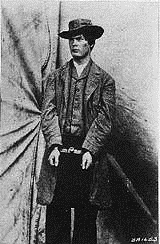
Lewis Powell
Another would-be assassin, Lewis Powell, was sent to kill Secretary of State William Seward on the same night, and attacked Seward with a knife after gaining entry to his home. Seward was recovering from a carriage accident several weeks before, and was wearing a jaw splint and surgical collard to help heal his broken jaw. It was this device that saved his life, although Powell stabbed the Secretary multiple times in the neck the splint prevented him from puncturing his jugular.
9. Lincoln was pronounced dead at 7:22 a.m. on April 15, 1865, at the age of 56.
The president’s body was placed in a temporary coffin, draped with a flag and escorted by armed cavalry to the White House, where surgeons conducted a thorough autopsy. During the autopsy, Mary Lincoln sent the surgeons a note requesting that they clip a lock of Lincoln’s hair for her.
Edward Curtis, an Army surgeon in attendance later described the scene, recounting that a bullet clattered into a waiting basin during the doctor’s removal of Lincoln’s brain. He wrote that the team stopped to stare at the offending bullet, “the cause of such mighty changes in the world’s history as we may perhaps never realize.”
10. Why was Abraham Lincoln’s assassination important?
The death of the President generated anger and feeling of revenge against the Confederacy and led to a more forceful period of reconstruction. His death also lead to Vice President Andrew Johnson assuming the presidency who became the first American President to ever be impeached.
Lincoln Letters
This transcription was copied from the original document and is representative of all spelling, punctuation, and grammar as written by the creator. The original document is housed in the Pearce Civil War Collection, Pearce Collections Museum, Navarro College, Corsicana, Texas. https://www.PearceMuseum.com
Fort Edward, N.Y.
April 30th 1865
Dear Mother –
I have just finished reading my Bible: and now, while waiting for the going to ring, I will commence my letter to you. It is a delightful day so quiet – so peaceful, and so fitting a time to worship our Maker…….
……..I wonder at Addie’s getting in to see the President for the papers stated that thousands of persons were not permitted to get a look of him the crowd was so large Perhaps she went at some part of the day when the crowd was not very large. I am glad she saw him. I little thought when I stood by his coffin, looking at his features, beautiful even in death, that any other member of our family had seen him. I went down to Albany Wednesday morning to see him. Charly H. went with me. The crowd was immense – a perfect jam. I never was so squeezed before, and don’t wish to be again. During the day there was one young lady killed by the crowd trampling upon her, and several had their arms and ribs broken. I can give you no description of the jam. A great crowd did not get in to see him. I saw him twice. I was the last one who looked at him; and I stood by his coffin nearly a minute. Addie has given you an account of it, what she saw, and I can add noting more. I will only say I saw the procession had a good view of the hearse as it passed – saw the coffin which contained the one whom all love. Saw the car in which the body was placed. I mean the Hearse Car – it was magnificent and the whole train upon the N.Y. Central Road, consisting of eight cars, was draped most beautifully in mourning I would have given a great deal rather than to not have seen what I saw that day. I got back here all safe the same evening, well pleased with and well paid for what trouble I had. It was no trouble, and was no more than the humblest citizen would have done, I am so glad that I saw the man that proclaimed freedom to a down trodden and the man whom everybody – even his enemies, now admire. I never expect to look upon another such a man. The words “Sec Semper Tyrannis” mean literally – “So always with tyrants” but those who have never studied the languages, make it read in various ways. The common reading is: “Thus perish all tyrants”; but that is not what the latin words signify. The term belies Abraham Lincoln, and no sane man will think of applying it to him. He never showed the spirit of a tyrant in anything…….
…….God bless all of you – Frank
